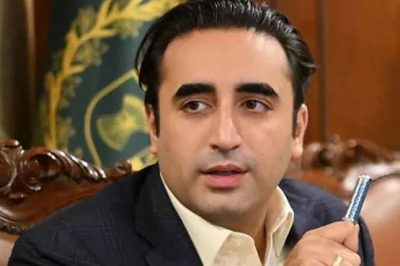The Bhutto name resonates like a few others in the vibrant tapestry of Pakistani politics. It is a name steeped in history, power, and tragedy—a legacy that now rests upon the shoulders of a young man barely into his thirties, Bilawal Bhutto Zardari. As the scion of one of South Asia’s most illustrious political families, Bilawal navigates the complex terrain of Pakistani governance, where dynastic politics are not just the norm but often the expectation.
At just 35 years old, Bilawal Bhutto Zardari assumed the mantle of chairman of the Pakistan People’s Party (PPP). This position came to him tragically following the assassination of his mother, the iconic Benazir Bhutto, in 2007. Since then, he has been groomed to lead, educated at Oxford, and thrust into the forefront of Pakistani politics at a tender age.
But Bilawal is not merely a product of his lineage; he is a figure attempting to carve his path in a landscape dominated by the legacies of his forebears. His journey from the hallowed halls of academia to the rough and tumble world of Pakistani politics is a testament to his resilience and commitment to his family’s vision of a progressive, democratic Pakistan.
However, the road ahead is fraught with challenges. In a political arena where charisma often trumps policy substance, Bilawal must contend not only with his youth but also with the weight of expectations that come with his last name. The Bhutto legacy, a double-edged sword of reverence and scrutiny, casts a long shadow over his aspirations.
Also Read: Who is voter of Imran Khan?
In the upcoming elections, Bilawal and the PPP have put forth an ambitious manifesto, promising social protection for the poor, strengthening the federation, and a host of freebies and benefits to uplift the marginalized segments of society. Yet, amidst these lofty pledges lies the perennial question: can he deliver?
Critics argue that Bilawal’s candidacy symbolizes a more significant issue within Pakistani politics—the perpetuation of dynastic rule at the expense of meritocracy and accountability. They point to the failures of past PPP administrations and question whether Bilawal represents genuine change or merely a continuation of the status quo.
However, it would be a mistake to ignore the subtleties of Bilawal Bhutto Zardari’s personality and the complexity of his role to write him off as the entire product of nepotism. He may bear an old name, but he is a young man grappling with contemporary challenges, striving to redefine his family’s legacy in a rapidly changing world.
As Pakistan stands at a crossroads, torn between tradition and progress, the emergence of Bilawal Bhutto Zardari symbolizes the resilience of its political institutions and the enduring allure of dynastic politics. Whether he succeeds or fails remains to be seen, but his journey serves as a poignant reminder that in politics, as in life, the past and the present are inextricably intertwined.
** The opinions expressed in this article are solely those of the author and do not reflect the views or position of World Affairs Insider. The organization neither endorses nor takes responsibility for the content of this article and its accuracy.








